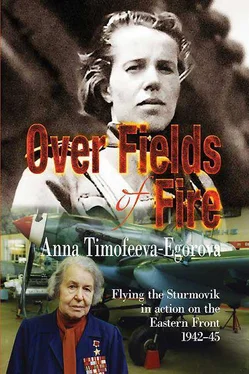“A plane, as you are aware”, he began, “is a plane and no matter how slow and simple it may be, you have to treat it respectfully — in other words, carefully and seriously. The experienced pilot-instructor Gavrilov had relied on his student but the latter neglected the laws of aerodynamics or knew them poorly — and here is the result. During the last turn, as we all saw from the ground, the plane nosed up, lost speed and fell into a spin. There was not enough altitude to pull the machine out of its critical position and it hit the ground. The profession of pilot”, Chernigovets continued, “is not only romantic but dangerous as you have seen for yourselves. But there is no point being down in the dumps, let’s get down to business!”
And he began to draw right there, on the sand, various plane positions in the air simultaneously explaining and asking one or another student. It helped the guys get over it.
For an instructor the first independent flight of his student is an event just like his own. I remember that the student-pilot Chernov was the first one from my group to be sent by me into the air. The detachment commander had already approved it but I was uneasy and requested the squadron commander to fly with him once more. The comesk 56 56 Translator’s note — abbreviation for ‘squadron commander’.
made a circular flight with Chernov and yelled “Why waste plane resources, let him go!”
I took the signal flags with emotion as the instructor Miroevskiy had done long ago. Everyone was watching the trainee pilot as he sat in the cockpit, focused and serious, and waited for permission to take off. I raised the white flag and then swiftly stretched my arm out showing the direction along the airstrip with the flag.
The plane headed for take off and it seemed to me I had forgotten something, hadn’t said something! I wanted to shout out some loud directions after him! Keeping my eye on the plane I walked to the finish point to meet my pupil at the landing T…
A student called Zhoukov was the second to fly and he made it superbly too. But a student called Sedov gave me a lot of trouble. While everything had been coming easily to Chernov, Sedov had learned to fly slowly, if surely. I understood that later, when all twelve students were already flying independently, and I began to summarise the hours they had spent with me in the air. It turned out Sedov had flown with me less than the rest. “How did that happen?” I thought about it and understood: I had held up Chernov as an example all the time but had made Sedov do more ground training. As a result more fuel and plane and engine resources had been spent on Chernov. But both of then flew at the same level by the end of the program, and Sedov even did it a little bit more elegantly and confidently.
One day the State Commission came upon us unawares but by now I was confident — my guys flew well. Only one student got a ‘four’ for aerobatics, the rest got excellent marks.
There was a festival at our aerodrome on Aviation Day. We, the pilot instructors, had been preparing for it ahead of time. We had been flying in formation, practising individual flying, flying in pairs and sixes. We’d been flying gliders too. Parachutists had been preparing their own program but it was we, the flyers, who would have to drop them. And early in the morning the aerodrome was ready to receive guests. The space for spectators was marked off a thick rope. We checked our planes time and again, specified the program — and the festival began!
At last the announcer called out my flight. I carried out an aerobatics set over the aerodrome, landed and hadn’t managed to taxi in when I was told: “Your mum is here”. It appeared that having found out from a provincial newspaper that there would be a festival here she came to Kalinin and headed to the aerodrome straight from the train station. Of course, mum had brought with her a basket of gifts. She sat down on the grass behind the barrier and began to watch what was happening in the air, and she was sitting quietly until my surname was announced. Then she got anxious and when I began to do aerobatics, mum rushed to the centre of the airfield shouting “My girl, you’ll fall down!” holding her festive lace apron as if she was setting it under me so in case I fell I would fall on it! Orderlies walked mum to headquarters. It was clarified who she was worried about — and then the head of the aeroclub offered her “a ride in an aeroplane”. But mum refused categorically…
After our students graduated we, the instructors, were awarded a river boat tour from Kalinin to Moscow to visit an agricultural exhibition. And soon we steamed down the Volga feasting our eyes upon the marvels on her banks. Then we sailed through the channel 57 57 Translator’s note — between the Volga and Moscow rivers.
: seeing the shipping locks for the first time, I was amazed and delighted. Then there was Moscow. We visited the exhibition, I also saw my family on the Arbat 58 58 Translator’s note — a Moscow street.
. Now Katya worked as a knitter at a stockinet factory, Yurka was studying at school. We talked a lot. My brother took an opportunity to send a letter in which he wrote that they had sailed down the Yenisei river for a while on a barge with criminals. The ‘mobsters’ scoffed at the ‘politicals’ and took away their clothes and food, but the guards either noticed nothing, or didn’t want to notice. In Igarka they were put ashore and marched into the tundra. Many of them caught cold and died. Less than half survived…
The second stage of the Moscow Metro was already in operation and I felt a longing to see my station, ‘Dynamo’. Its columns were tiled with semi-precious onyx. There was a bench between the columns and behind it in a niche — a bas-relief of an athlete. It was beautiful!
In the Metrostroy I found out that nearly all my mates from the Metrostroy aeroclub had graduated from the flying schools and were now serving in the Air Force. Victor Koutov was a fighter pilot in an aviation regiment on the Western border. He’d been writing me letters in verse, asking a reply to each of them but as always I had had no time. After graduation from the school Victor had visited me in Kherson hoping to take me away with him but I didn’t even want to listen to him.
“Once I graduate I’ll come to you myself”, I responded back then.
“You won’t! I know you pretty well. You’ll have to be dragged to the altar.”
“You do that then!” I burst out angrily. Victor left, and I was very melancholy. I would walk to school in tears… maybe I had a premonition that I’d seen him for the last time in my life…
We spent five days in Moscow and when we got back home we set about work so intensely that there not even weekends any more. Through the whole pre-war winter we trained pilots drafted via a special call-up of pre-conscription-aged youth. They were fully exempted from work and studying in any institutions. The aeroclub paid them an allowance. By the spring we had trained all of them and all of them were recommended for accelerated transfer to flying schools. In fact back then we had guys from two call-ups — exempted from work and not exempted from work. The students who studied without exemption from work started flying in the summer — after the graduation of the guys from the special call-up. Day after day we helped them find their wings and not all of them had started to fly independently when the war broke out.
Flying had dragged on till evening and a June night comes late. I was already tired but couldn’t go home: I still had to do debriefing with the trainee pilots, and write up paperwork. As soon as I had sat at the desk my friend Mashen’ka 59 59 Editor’s note — a common diminutive for Maria.
Smirnova stuck her head in the door, “Don’t sit up late, Anyuta 60 60 Editor’s note — yet another diminutive for Anna.
, we’re going to the forest in the morning. We’ll have you up with the sun!” she said and flitted away.
Читать дальше












